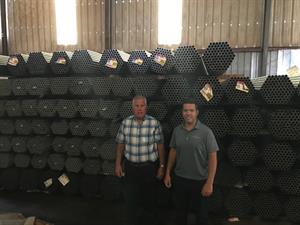The cost of doing business in the water well industry has been impacted since a 25% tariff on steel imports went into effect on March 23.
Following a U.S. Department of Commerce study released on January 11 regarding proposed tariff action, the price of U.S. steel mill products has risen across the United States. Domestic steel mills have raised their prices based on what their replacement cost of the material will be and increased demand due to expensive imports.
In turn, the tariff has awakened U.S. steel production, but it has hurt U.S. manufacturers and suppliers like those in the water well industry purchasing from these steel mills.
Bob Engeman Jr., CEO of Simmons Manufacturing Co., says prices for U.S.-made steel pipe have jumped 45% since February. He has seen the same increase on imported steel pipe.
 Lead times on domestic pipe have gone from three weeks to eight weeks, Engeman says, because U.S. steel mills are busy ramping up production to handle the demand. He says his company is safeguarded by not relying on just in time inventory but instead carries a safety stock of inventory.
Lead times on domestic pipe have gone from three weeks to eight weeks, Engeman says, because U.S. steel mills are busy ramping up production to handle the demand. He says his company is safeguarded by not relying on just in time inventory but instead carries a safety stock of inventory.
Simmons Manufacturing Co. CEO Bob Engeman Jr. with his son, Robert Engeman III,
product manager, at their 85,000-square-foot manufacturing facility
in McDonough, Georgia. Photo courtesy Simmons Manufacturing.
“Simmons is known for shipping their orders when they’re placed, so we carry a lot of inventory to protect ourselves for that reason,” Engeman says.
However, Simmons Manufacturing is facing additional challenges from imported products.
The 25% tariff is only in effect for “steel mill products,” not finished products. Companies that import finished products into the United States are unaffected by the tariff. For example, the yard hydrant that Simmons Manufacturing produces in McDonough, Georgia, with U.S.-made pipe is a product that companies can import as a “finished” product without being affected by the tariff.
Engeman says the same scenario exists for steel well seals as a “finished” product. Companies can import steel well seals to the United States without bumping up against the tariff. Engeman has also seen a 35% price increase on U.S.-made steel plates his company purchases.
These market conditions led Simmons Manufacturing on July 15 to raise its prices on select products to remain competitive but not overpriced compared to companies of imported products. It’s a delicate tightrope to walk for Simmons Manufacturing, a third-generation, family-owned business making water well supplies since 1957.
On the supply side of the water well industry, Victory Steel Products Corp. experienced a flurry of business activity once the tariff was announced. It lasted from late March through the first-half of May, with its tonnage shipment and prices jumping 20% to 25% in the second quarter.
Much of the activity was attributed to water well contractors and distributors buying to beat the ensuing steel price increase, says Jeff Stephens, general manager at Victory Steel in St. Louis, Missouri. Many water well system professionals and distributors have been forced to pass on a price increase to their customers due to the market conditions.
“It’s been a good year,” Stephens says. “Tons should be up for the year. We’re not projecting the second half to be as good as the first half as things normalize. Nonetheless, we should have a good second half of the year.”
As of July 20, there appears to be hesitation in the market, according to Stephens. He says there is concern by many of not wanting to get caught with higher priced inventory entering the winter, understanding that market conditions and pricing could change after January 1, 2019.
Stephens adds that the annual sub-quotas for Korean steel imports for 2018 under Section 232 tariffs overseen by the U.S. Customs and Border Protection agency are already filled. He expects price quotes for Korean steel imports for 2019 to take place in September, and once product is available for import the prices at U.S. steel mills could decrease.
Freight costs have also risen for many working in the water well industry due to, among others, a work shortage in the trucking industry. Stephens says his company has seen a 25% increase in freight costs from the first quarter of this year and as much as a 50% increase since 2017. Much of this increase is reflected in Victory Steel’s selling prices.
“It’s been a challenging year and it continues to be a challenge,” he says. “Now everybody has to keep an eye on the future. You’ve got to stay light on your feet and react quickly. If you had a good year based on what just happened, you don’t want to give it all back.”